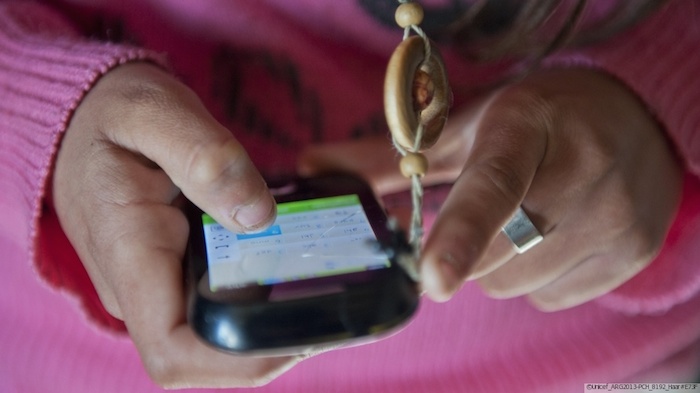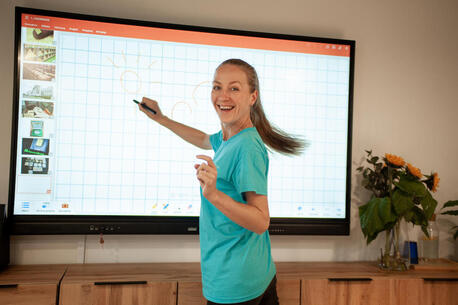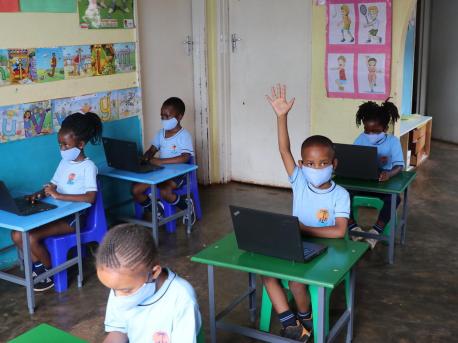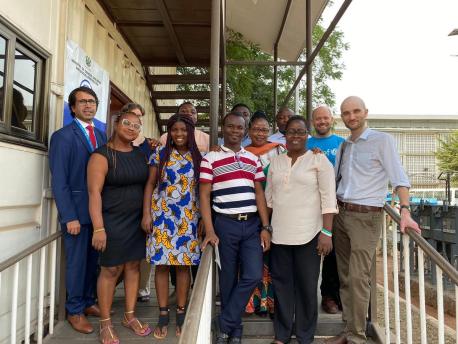
UNICEF and UNICEF USA Call for Empowering Children in the Digital Age
As more children use technology and the Internet for everything from health information to civic engagement, UNICEF, UNICEF USA, GMSA and Microsoft co-convene a major industry conference about child empowerment.
UNICEF & UNICEF USA Help Organize A "Tech" Conference on Kids
On November 14, 2017, UNICEF and UNICEF USA invited movers and shakers in technology, the media, children's products and services, telecommunications, and experts on children's rights to an important, all-day conference, entitled "Empowering Children in a Digital Age." The venue? Microsoft's Policy and Innovation Center in Washington, D.C. The goal? To dig deep into issues of privacy, digital literacy and freedom of expression and the right to be heard as they affect children around the word.
Our co-hosts were GMSA and Microsoft. Participants included major global companies such as Google, the Lego Group, the Millicom Group, the Orange Group, Telefonica International USA, Tencent, Twitter and the Walt Disney Company. Corporate foundations such as the Mozilla Foundation and the Vodafone Americas Foundation also attended.
And, there were also experts from the Center for Democracy and Technology, Common Sense Media, Civic Nation, Harvard University's Berkman Klein Center for Internet & Society, and the National Cyber Security Alliance — among many others.
Keynote speakers included digital youth activists Adora Svitak and Amani Al-Khatahtbeh.
Why A Conference about Children, Technology and the Internet?
Well, you'd have to be living off the grid not to notice: The Internet is teeming with children. Across the globe, young children and adolescents are diving into social media and onto the Web in greater and greater numbers, using technology like mobile phones, laptops, and game consoles.
With all this digital access, children have boundless opportunities for these kids to play, learn, connect with peers, voice opinions on issues they're passionate about — and in more and more cases — affect real social change.
Yet millions of the most marginalized children, about 29 percent – or approximately 346 million individuals – are not online. African kids and adolescents are the least connected. Around 60 percent are not yet online, compared with just 4 percent in Europe.

Children and adolescents under 18 account for an estimated one in three Internet users around the world. © UNICEF
These are the rewards and the challenges of today's rapidly evolving digital world. A world that, thanks to widespread wireless connectivity, now includes children living in remote communities and war zones, vulnerable children, children who otherwise would not have a voice, and yet still excludes millions of other children.
There is a flip side to all this, of course, and it raises a question that's about as old as the Internet itself: How do we keep all these children safe from harm and abuse online? How do we protect their rights regarding digital engagement — without taking away the benefits?
How do we — safely — empower children in a digital age? And, how do we ensure that more children, particularly in Africa, have access to technology and the Internet?

Young women attend a computer training class in Homs, Syria. © UNICEF/UNI156473/Noorani
What the Conference Participants Discussed
The daylong event focused on three main themes: the intersection between digital media and privacy, protection of personal information and reputation; the promotion of digital literacy to foster positive online participation and citizenship; and how the Internet supports civic engagement and the right to be heard.
.@UNICEF's Andres Franco: 1 in 3 of the next billion users online will be under the age of 18. We MUST #emPOWERchildren in a digital world. Here are @UNICEF's guidelines: https://t.co/DjgsLUZw5jpic.twitter.com/pL02jkkjY8
— UNICEF USA (@UNICEFUSA) November 14, 2017
"I’ll never be able to express how grateful I am that my parents taught me to see the internet first as a place where I could stretch my wings, not as a place where bogeymen could hurt me," said youth digital activist and author Adora Svitak. "To achieve more expansive vision of kids’ digital lives, we need to go from just asking “are they safe?” to “Are they smart? Are they funny? Are they finding and creating community? Joining or starting movement? Thinking about addressing inequalities?”

Worldwide, 71% of youth are online. Only 48% of the general population is. © UNICEF
Many participants spoke to the need to find the right balance, to support kids who are using the Internet in a positive way. "Encouraging safe and responsible use of mobile services is not just about safeguarding children," said Natasha Jackson, the GSMA's head of public policy and consumer affairs. "It's also about safeguarding opportunities for civic engagement, for learning, communicating and creating — activities that are central to young people's lives."
Andres Franco, UNICEF's Deputy Director of Private Sector Engagement, pointed out how connectivity can be a game changer for some of the world's most marginalized children, helping them to fulfill their potential and break intergenerational cycles of poverty. The Internet supports learning in remote regions and during crises, for example; it can help young people find jobs and other economic opportunities.
We all want children to stay safe — and to realize the true benefits of technology and to succeed in our 21st Century digital world.
Microsoft's Chief Online Safety Officer, Jacqueline Beauchere, described the company's three-pronged approach: build safety features into products from the outset; educate users of all ages about the risks; and collaborate with others in industry, government and civil society to help mitigate those risks. "We all want children and young people to stay safe — and to be able to realize the true benefits of technology and to succeed in our 21st Century digital world," Beauchere said. "No one entity or organization can do it alone."
In a world where sharing data has become common-place, it’s critical that we set global, adaptive principles & policies that #emPOWERchildren across sectors. —Kathryn Montgomery, @AmericanUpic.twitter.com/mQ29CLsjmD
— UNICEF USA (@UNICEFUSA) November 14, 2017
"Today's generation has more access to technology than any other generation in history," Amani Al-Khatahtbeh, founding editor-in-chief of Muslim Girl and a YouTube Creator for Change, noted. "Online, borders and geographic limitations don't exist, and the access to knowledge and connections is limitless. That's a tremendous amount of power for any young person to have." And this, Al-Khatahtbeh added, is an opportunity not be shied away from, but embraced for its potential to transform the lives of children everywhere.
What Were Some Key Conference Takeaways?
UNICEF USA's Sarah Jacobstein, one of the conference organizers, noted the following key takeaways in a post-conference email to participants:
- Viewing children, technology and the Internet through the lens of the U.N. Convention on the Rights of the Child is key. Children are rights holders, and we must take a balanced approach to fulfilling all of their rights, including both safety and the right to be heard.
- Digital education for young people should go beyond protection to knowing their rights.
- Privacy challenges include: increasing the speed and consistency with which government policy is developed to match both the speed of technology and its global application, improving parent tools (so that they work, but don’t infringe on kids’ rights), and enhancing awareness about, and accessibility to, privacy tools and digital education for children.
- We can’t empower children in the digital world if we don't inform parents about the positive aspects of children engaging in the digital world.
- Children must be considered during the creation of all digital products from the very beginning (both to think through all possible risks and opportunities) and to create a culture where engineers think about the impact of innovation on children.
- Digital platforms have a tremendous power to “shine a light” on good things that children and young people are doing.
- With the right training, young people can be hugely powerful in pushing back on messages of hate online.
Next Steps: How The Private Sector Can Help Empower Children, Improve Safety & Expand Access
First, private sector organizations and leaders can learn more about these vital issues by reading one of UNICEF's signature annual thought leadership reports: the State of the World's Children (SOWC 2017). This year, SOWC 2017 focuses on children, technology and the Internet. The report offers detailed global research on children and technology, while issuing specific calls-to-action for the private sector, among other audiences.
Feel free to contact UNICEF USA's Sarah Jacobstein for more information on how your company can engage with UNICEF's Child Rights and Business initiative and empowering children in a digital world.
And, please join the conversation. Use the hashtag #emPOWERchildren.
Announcing UNICEF's new report: The State of the World’s Children 2017: Children in a Digital World.
HOW TO HELP
There are many ways to make a difference
War, famine, poverty, natural disasters — threats to the world's children keep coming. But UNICEF won't stop working to keep children healthy and safe.
UNICEF works in over 190 countries and territories — more places than any other children's organization. UNICEF has the world's largest humanitarian warehouse and, when disaster strikes, can get supplies almost anywhere within 72 hours. Constantly innovating, always advocating for a better world for children, UNICEF works to ensure that every child can grow up healthy, educated, protected and respected.
Would you like to help give all children the opportunity to reach their full potential? There are many ways to get involved.





